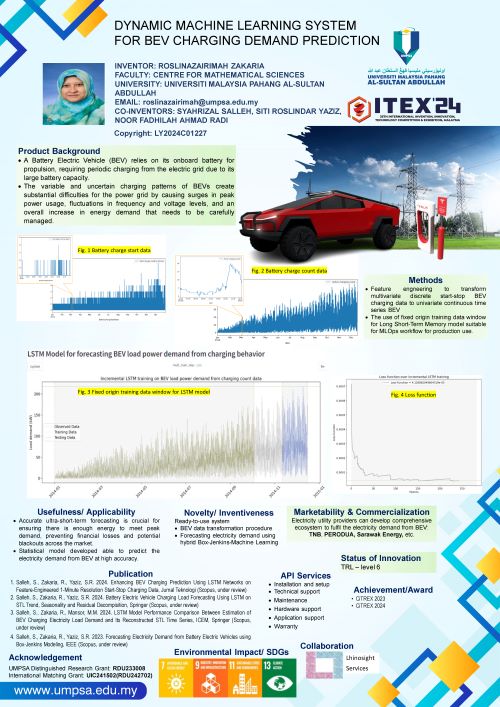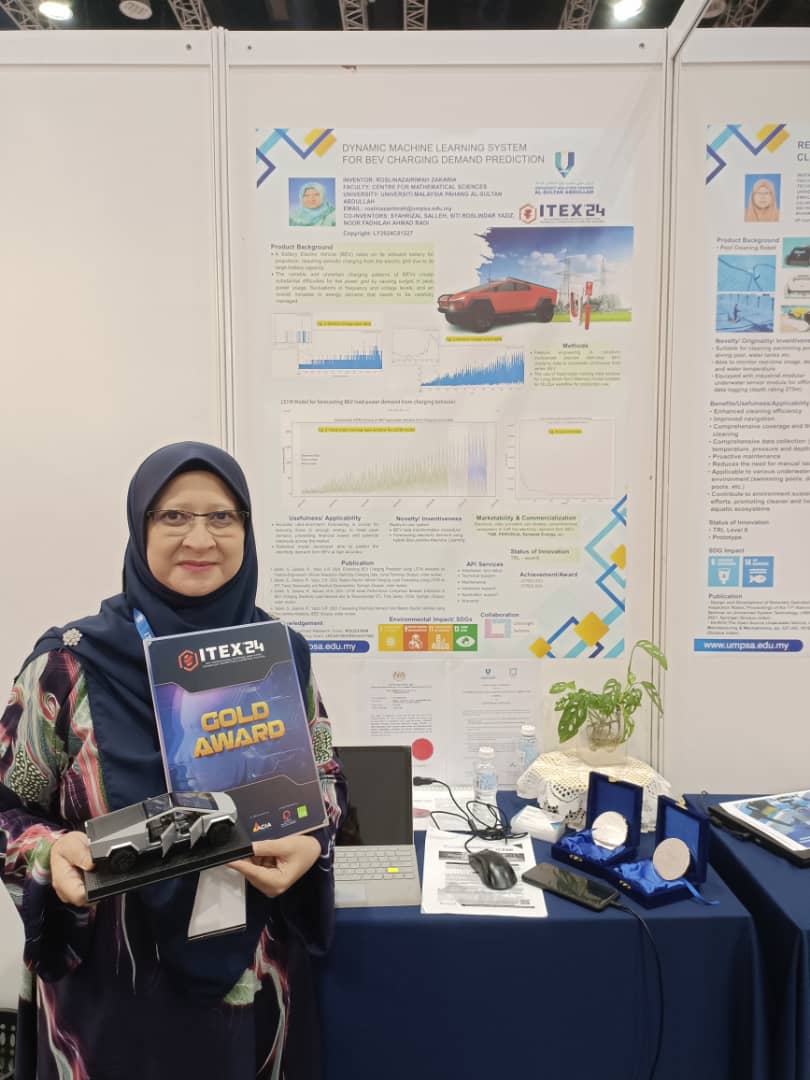Associate Professor Dr. Roslinazairimah produces electricity forecasting software for electric cars
PEKAN, 27 May 2024 – It is common knowledge that the use of electric cars in Malaysia is gaining attention, especially Malaysian automotive enthusiasts and consumers.
However, the increasing use of electric cars will also affect the generation and distribution of electricity in Malaysia because the battery capacity of electric cars is large and needs to be connected to the electricity supply system to be charged.
The lecturer of the Centre for Mathematical Sciences (PSM) Universiti Malaysia Pahang Al-Sultan Abdullah (UMPSA), Associate Professor Dr. Roslinazairimah Zakaria produced software to predict the electricity requirements with high accuracy using statistical modelling hybridised with machine learning models.
This research was conducted with the lecturer of PSM UMPSA, Dr. Siti Roslindar Yaziz, lecturer of Universiti Teknologi Mara (UiTM), Dr. Noor Fadhilah Ahmad Radi and UMPSA postgraduate student, Syahrizal Salleh.
According to her, the increase in the use of electric cars in Malaysia will lead to an increase in the need for electricity that needs to be generated by electricity producing industries such as Tenaga Nasional Berhad (TNB).
“An accurate electricity demand forecasting model is absolutely necessary to avoid demand exceeding the capacity of the electricity generated.
“The lack of electricity can cause power outages, affect other industries and further stunt the country’s economic growth.
“The need for electricity from private chargers is dynamic because it depends on consumer activities such as during festive seasons, weekdays and weekends,” she said.
She added that the location of electricity needs will also change depending on the movement of electric vehicles such as swarm models.
“The infrastructure of the electricity supply system in strategic locations needs to be improved to ensure adequate electricity supply,” she said.

Malaysia is one of the countries that signed the Paris Agreement (Paris Climate Accords) in 2016 to limit the increase in global temperature to 1.5 °C since the era of industrialisation (starting in 1800).
In 2021, the 26th Conference of the United Nations Climate Change Conference (COP26) known as the Glasgow Climate Pact with the majority of members of the United Nations Framework Convention on Climate Change (UNFCCC) agreed to reduce the use of coal and fossil-based fuels for electricity generation and switch to green technologies to generate electricity such as solar and wind technologies.
She said that now we can be proud when Malaysia has shown a commitment by formulating policies to increase the use of electric cars to reduce carbon dioxide emissions.
“Electric cars rely on the energy stored in the battery to drive them.
“This software can reduce the gap between generation and the demand for electricity needed.
“In turn, it can reduce the risk of power outages and optimise operating costs,” she said.
The research, which began in 2021, was completed in early 2024 using data from a private electric car charger taken from research titled My Electric Avenue in 2017 in the United Kingdom.
According to her, the observed data should be changed to a time series format that can be modelled.
“After that, a statistical model hybridised with a machine learning model was built to predict electric energy consumption by electric cars that are being charged at private chargers for the next few minutes (ultra-short term load forecasting).
“This software can predict the amount of electricity needed with high accuracy at 98.8%.
“To extend the functionality of this software, private electric charging data from electric car manufacturers such as Perodua and Proton are needed to accurately predict electricity demand according to a dynamic location at a time and we have also held preliminary discussions with Perodua,” she said.
She said this is because the electric car private charging data obtained from Perodua or Proton can be analysed using this software to provide accurate information to electricity supply companies such as TNB to plan and develop appropriate and sustainable infrastructure.
“The estimated cost of the software is based on a working day wage of RM2,000 per day for a researcher for a period of five to ten days.
“Previously, I produced a machine learning model to predict chilli prices in Malaysia as well as economic indicators using econometric models,” she said.
The software won a silver medal in the Invention, Creative and Innovation Competition (CITREX) 2023 and CITREX 2024, while it received a gold medal in the 35th International Invention, Innovation & Technology Competition & Exhibition, Malaysia (ITEX) 2024 which took place on 16 to 17 May 2024 at the Kuala Lumpur Convention Centre (KLCC).
By: Nur Hartini Mohd Hatta, Centre for Corporate Communications
Translation by: Dr. Rozaimi Abu Samah, Faculty of Chemical and Process Engineering Technology
- 132 views










